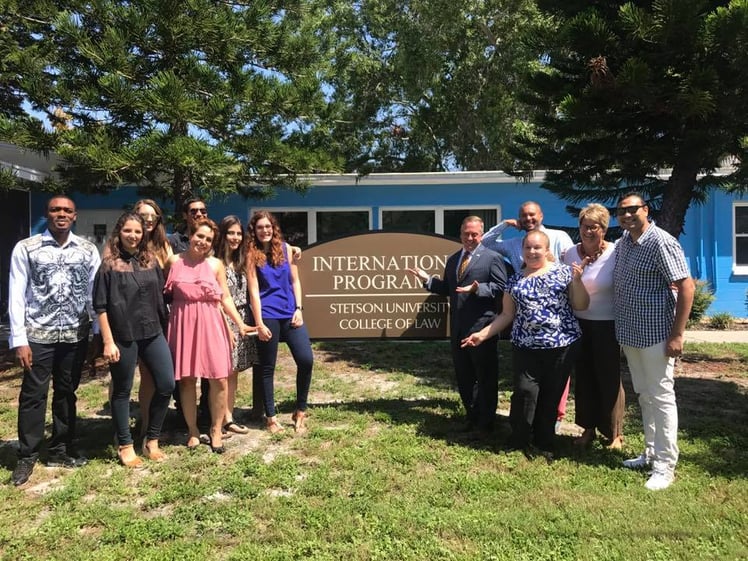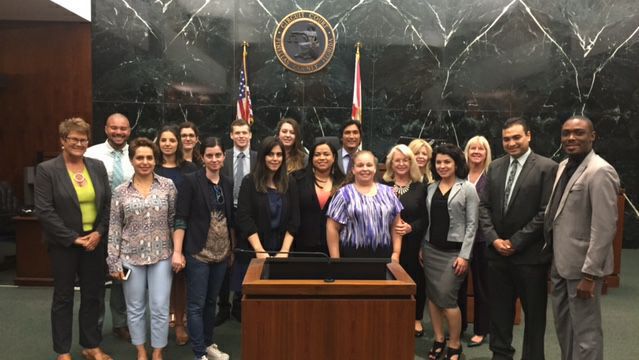International law student compares experience of law school at Stetson with Nigeria
By Nathaniel Ovabor
An African Proverb says that “every country has her own way of seasoning chicken.” Going to law school in Nigeria is quite different from the experience in a U.S. law school like Stetson, though they do have some basic similarities.
First of all, the structure of law school and generally how one becomes a lawyer is different. In Nigeria, those who desire to be lawyers are not required to attend an undergraduate program before attempting a law degree like in the United States. Nigerian students go to the university and learn fundamental law for five years in a college of law to obtain a first degree called a Bachelor of Laws (LL.B.).
After that they attend another institution called a “law school’ for one year to learn the procedural aspect of the law including criminal litigation, civil litigation, property law, corporate law practice and the rules of professional conduct. The successful completion of the program allows one to obtain a qualification certificate as a Barrister and Solicitor of the Supreme Court of Nigeria with which one can practice as a lawyer anywhere in Nigeria. Due to this structural difference, I was only 17 in my first year as a law student at the University of Benin, Nigeria. While in contrast, most first-year law students in the U.S. are well into their 20s when they first begin to learn about the law.

Nathaniel Ovabor gathers with international students, Stetson Law leadership, in front of the International Programs Office.
Another difference between the two experiences is the dress code for law students. As a law student at the University of Benin and the Nigerian Law School, it was mandatory to attend lectures in what we call, black and white clothes. Ideally men must wear black trousers, white sleeves and a black tie with a black jacket, and women wear black skirts, white sleeves and a black jacket. A breach in dress code can lead to a penalty.
To my amazement, at Stetson it seem that law students can wear literally anything to attend lectures including pajamas, basketball jerseys, swimming trunks and the all-American jeans. Observing this trend daily brings to mind the words of Dan Rather: “Americans can put up with anything, provided it doesn’t block traffic.”
In the light of the aforementioned contrast in dress code, my first day of lecture at an American law school in Stetson was quite an interesting one. There I was seriously dressed in a business suit and neck tie, ready to ‘kill’ and ‘dissect’ the law, for I thought law students everywhere in the world should always dress corporate to class, but I was wrong—not at Stetson, not in America, a land founded on “freedom” and “the pursuit of happiness.” I felt awkward in my business suit as I saw the rest of my colleagues dressed like I would on a Saturday evening, taking a walk on the streets of Abuja. I did not hate myself for it, but I went back to my room after lectures determined to always have it in mind that “this is not Nigeria.”

Nathaniel Ovabor attends law school at Stetson.
The next day of class, I woke up in the morning, went to my bedroom closet, dug out my multi-colored Gucci hat, blue jean and a Versace shirt with brown sneakers to match and wore them to class with my bag hung across my shoulders. I went to class and felt I had made the right decision when I saw the way others were dressed. As I moved to take my seat with the U.S. Constitution in hand, I took a brief look at the mirror near me and saw myself looking like a Justin Bieber in class. It was then a small voice within said to me “Welcome to America, Nate.”
Be that as it may, a very interesting aspect at Stetson is the teaching methodology, which is quite different from what is in a Nigerian university. In the United States, professors adopt the Socratic Method which is very interactive and engages the students by asking questions that beget questions which may provide a broader perspective on a given topic. This is not always the case in Nigerian universities. The teaching method at Stetson motivates me to always read well ahead before each lectures. The professors at Stetson are very personable and accommodating which makes every lecture relaxed and easy to digest.

International law students visit a courthouse with alumna Judge Pamela Campbell.
Furthermore, at Stetson, the community is more multicultural than what we have back home. There are rarely international students or foreign lecturers in Nigerian universities. At Stetson, the international students are many and very well accepted, and they enjoy a great deal of support from the International Programs Office. There are also professors with international backgrounds whose stories and lectures I find very inspiring. One of such is Professor Luz Nagle, who learned English as a second language after having already excelled in the legal profession in Colombia, her country of birth, and rode to the peak of her career to become a professor at Stetson University College of Law.
Indeed, like Condoleezza Rice once said,“In America, with education and hard work, it really does not matter where you come from, it matters only where you are going.” And I am sure with my Stetson Law education I will succeed. I encourage prospective students to consider Stetson Law for their future studies and email the International Programs office if you have any questions.
Post date: Jan. 5, 2018
Media contact: Kate Bradshaw
[email protected] | 727-430-1580